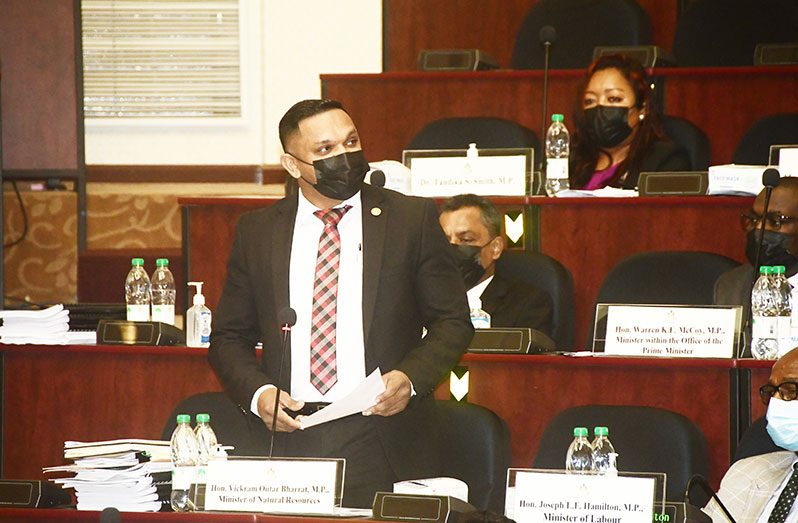OIL companies that fail to outsource most of their services to entities owned and run by Guyanese could face a penalty of up to GY$50 million, according to provisions set out in the landmark Local Content Bill, which was tabled in the National Assembly on Thursday last.
The new Bill, presented to the Parliament by Natural Resources Minister Vickram Bharrat, seeks to ensure that Guyanese and Guyanese-owned businesses are given preference when it comes to providing goods and services to the major oil companies operating within Guyana’s borders.
It outlines 40 areas and the minimum local content requirements for each. For instance, by the end of 2022, oil companies and their sub-contractors must ensure that 100 per cent of their ground transportation needs are satisfied by Guyanese entities.
The same percentage applies to the provision of immigration support services, customs brokerage services, and visa and work permit services. Similarly, 90 per cent of services relating to the rental of office spaces, the provision of catering services, accommodation services, laundry and janitorial services, and legal services must be procured from local entities.
“The farmers at Black Bush Polder, their food can go on the floating production storage and offloading (FPSO) vessel. Our provisions and our meat can make it out there on the FPSO. That is creating opportunities for poultry, cash-crop farmers; everyone in the agriculture sector, as well as the others to benefit from the oil-and-gas sector,” Minister Bharrat said in his presentation to the National Assembly. Meanwhile, the areas that requires the least amount of local content are engineering and machining.
Additionally, in an effort to enable Guyanese to take advantage of all aspects of the oil-and-gas industry, ‘Employment Sub-Plans’ were included in the Bill.
This aspect requires a forecast of the hiring and/or training needs of a contractor, sub-contractor or licensee, particularly outlining, among other things, the specific skills and competencies needed and any anticipated shortages of skillsets in the Guyanese workforce.
The sub-plan also requires oil companies to accelerate industrial and technical education and training for Guyanese, in keeping with performance standards.
Further, the proposed legislation states that in cases where a Guyanese national “has the relevant qualification, but does not possess the requisite experience, that Guyanese national shall benefit from necessary training, and work alongside a non-Guyanese national [sic] who will serve as a coach or mentor for a period determined by the minister, after consultation with the [Local Content] Secretariat.”
The Bill also makes provisions for a Procurement Sub-Plan, which would require the crafting of a supply-chain management strategy, including a forecast of required goods and services, and provide Guyanese nationals with timely and appropriate access to information, business opportunities, joint venture and partnership opportunities, technology and “know-how”; contract and payment terms that facilitate competitive financing and growth; and an effective performance-management system aimed at garnering feedback for improvements.
Even more explicitly, the Bill proposes the implementation of a Local Capacity Development Sub-Plan, which is expected to include standards for measuring and comparing suppliers’ capabilities, qualifications and certification of skills, goods and services, along with local market condition analysis and fostering an environment that accommodates partnerships between Guyanese and non-Guyanese entities.
“This legislation is a way of moving our developmental agenda forward,” Minister Bharrat insisted.
“We believe that Guyanese must benefit from this new sector. We might not have the knowledge and requisite skills now, but I am sure that in years to come and with the programmes that the government is putting in place, both in the human-resource capacity, as well as the capacity in our local private sector to ensure that they place a meaningful role in the oil-and-gas sector and bring true benefits to Guyanese and Guyanese businesses.”
The Bill, which seeks to give Guyanese first preference and knowledge-sharing in the oil-and-gas sector, is still to be debated in the National Assembly, and even though there are just a few days left in the year 2021, the Dr Irfaan Ali government has its sights set on having the new law passed by the House and signed into law before next year.
Since assuming office in August 2020, President Ali had pledged to ensure passage of the Local Content Policy, so that Guyanese can benefit optimally from the bounties being extracted off-shore Guyana, and all the positive spin-off opportunities that will emerge from the already booming petroleum sector.




.png)









